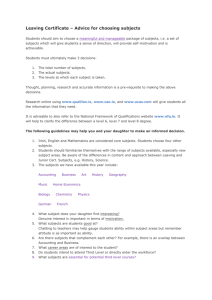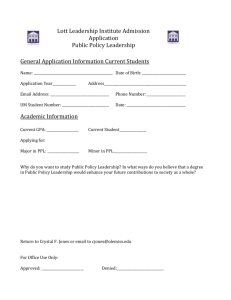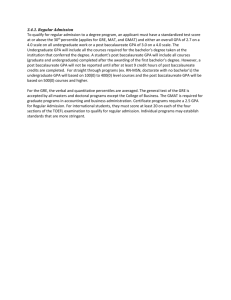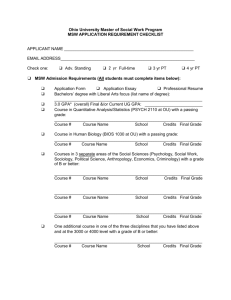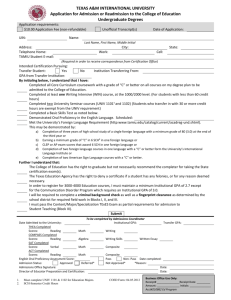Admission from key assessments used for entry to programs
advertisement
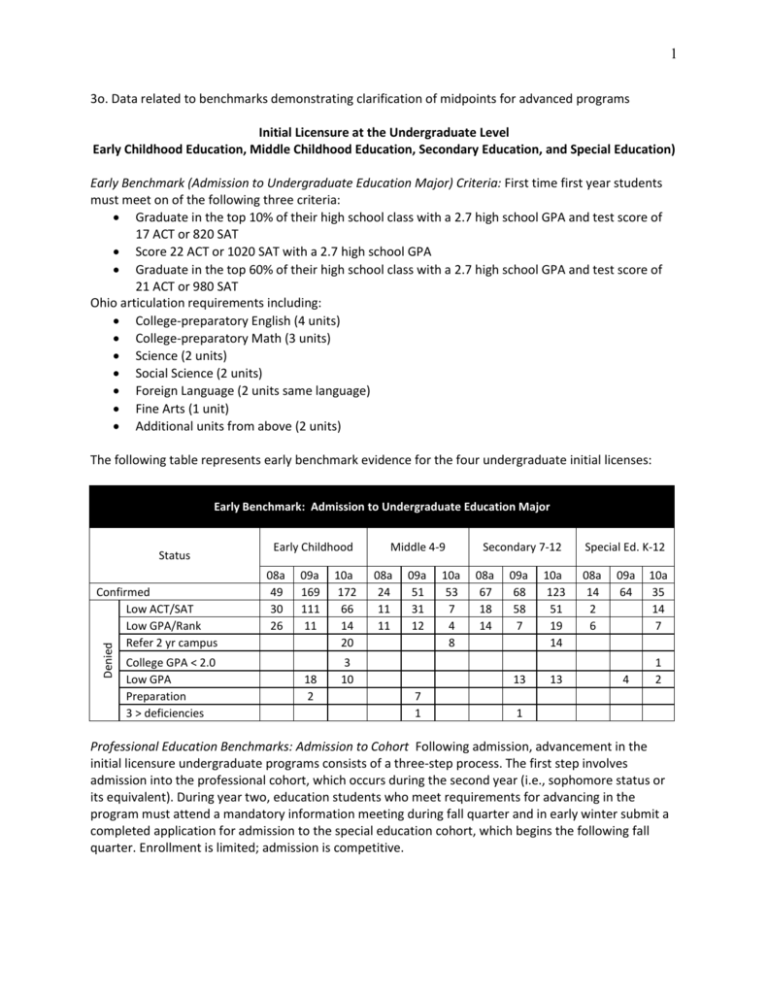
1 3o. Data related to benchmarks demonstrating clarification of midpoints for advanced programs Initial Licensure at the Undergraduate Level Early Childhood Education, Middle Childhood Education, Secondary Education, and Special Education) Early Benchmark (Admission to Undergraduate Education Major) Criteria: First time first year students must meet on of the following three criteria: Graduate in the top 10% of their high school class with a 2.7 high school GPA and test score of 17 ACT or 820 SAT Score 22 ACT or 1020 SAT with a 2.7 high school GPA Graduate in the top 60% of their high school class with a 2.7 high school GPA and test score of 21 ACT or 980 SAT Ohio articulation requirements including: College-preparatory English (4 units) College-preparatory Math (3 units) Science (2 units) Social Science (2 units) Foreign Language (2 units same language) Fine Arts (1 unit) Additional units from above (2 units) The following table represents early benchmark evidence for the four undergraduate initial licenses: Early Benchmark: Admission to Undergraduate Education Major Status Denied Confirmed Low ACT/SAT Low GPA/Rank Refer 2 yr campus College GPA < 2.0 Low GPA Preparation 3 > deficiencies Early Childhood 08a 49 30 26 09a 169 111 11 18 2 10a 172 66 14 20 Middle 4-9 08a 24 11 11 09a 51 31 12 3 10 10a 53 7 4 8 Secondary 7-12 08a 67 18 14 09a 68 58 7 13 7 1 10a 123 51 19 14 13 Special Ed. K-12 08a 14 2 6 09a 64 4 10a 35 14 7 1 2 1 Professional Education Benchmarks: Admission to Cohort Following admission, advancement in the initial licensure undergraduate programs consists of a three-step process. The first step involves admission into the professional cohort, which occurs during the second year (i.e., sophomore status or its equivalent). During year two, education students who meet requirements for advancing in the program must attend a mandatory information meeting during fall quarter and in early winter submit a completed application for admission to the special education cohort, which begins the following fall quarter. Enrollment is limited; admission is competitive. 2 Standards for admission to the professional cohort are: Minimum grade point average (early childhood — Minimum 2.8 overall GPA; Middle childhood — Minimum 2.6 in content, 2.8 cumulative GPA; Secondary education — Minimum 2.5 in content, 2.8 Cumulative GPA; Special education — Minimum 2.7 cumulative GPA, 2.5 content GPA.) The Pre-Professional Skills Test (PPST) or PRAXIS I, designed to provide information about basic proficiency in communication and computational skills, is required of all incoming students who have not achieved an ACT composite of 22 or better or a total SAT score of at least 1000. The minimum passing scores, effective fall quarter, 2008, for the PPST (PRAXIS I) are 173 in reading, 172 in mathematics and 172 in writing. These minimums are subject to change to satisfy state mandates. Majors have generally completed 60 hours of course work at cohort application time. All candidates are required to sign an affidavit that they have not pled guilty to, or been convicted of, any misdemeanor (other than traffic offenses), any felony, any violation of Section 2907.04 (corruption of a minor), or Section 2907.06 (sexual imposition), or Division (a) or (c) of Section 2907.07 (importuning) of the Ohio Revised Code, any offense, or drug abuse offense that is not a minor misdemeanor, or any substantively comparable ordinance of a municipal corporation or of another state. Any student who fails to meet this requirement may be denied admission to a licensure program. Professional Education Benchmarks: Admission to Internship Once admitted into the cohort, students take their professional education courses. Candidates must provide a BCI report prior to entering a practicum. During the third year, students also complete a practicum. The second step of the admission process occurs during this year. During the fall quarter of the third year, students must attend a mandatory information meeting. In late winter, students must submit a completed application for admission to the internship that begins the following fall quarter. Candidates must maintain the minimum GPA of 2.8 and successfully complete all field experience to be considered for internship. Professional Education Benchmarks: License Completer. Undergraduates who are license completers must : Complete all required course work and program requirements Attain at least a 2.8 cumulative grade point average, with a 2.5 GPA in both content areas Be in good academic standing; that is, not on academic or disciplinary probation or suspension Meet the college's residency requirement of 45 credit hours File formal application for the degree by the posted quarter of graduation deadline Submit passing scores on required Praxis II licensure tests Be recommended by the program. Data related to these benchmarks are presented in this table: 3 Initial Benchmark: Admission to Professional Education - Licensure Programs Early Childhood Middle 4-9 Cohort Language Arts 712 Mathematics 712 Science 7-12 Social Studies 712 Special Education k-12 Applied 08 a 75 09 a 88 10 a 79 08 a 77 09 a 71 10 a 72 08 a 24 09 a 20 10 a 26 08 a 7 09 a 3 10 a 11 08 a 23 09 a 9 10 a 17 08 a 15 09 a 23 10 a 24 08 a 81 09 a 54 10 a 93 Accepted 75 76 75 76 63 50 22 18 24 6 2 9 14 7 14 11 19 19 72 51 87 Midpoint Benchmark: Admission to Internship/Student Teaching - Licensure Programs Internshi p Approved Early Childhood Middle 4-9 Language Arts 712 Mathematics 712 Social Studies 712 Science 7-12 Special Education 08a 09 a 10 a 08 a 09 a 10 a 08 a 09 a 10 a 08 a 09 a 10 a 08 a 09 a 10 a 08 a 09 a 10 a 08 a 09 a 10 a 67 71 75 68 50 77 14 17 22 13 6 2 23 7 14 15 19 22 64 55 84 Program Completion: Successful Student Teaching ; Must submit Teacher Performance Assessment beginning 11a Early Childhood Middle 4-9 Internship Successful Language Arts 712 Mathematics 712 Science 7-12 Social Studies 712 Special Education k-12 08 a 09 a 10 a 08 a 09 a 10 a 08 a 09 a 10 a 08 a 09 a 10 a 08 a 09 a 10 a 08 a 09 a 10 a 08 a 09 a 10 a 66 73 74 67 48 76 14 17 26 5 7 0 11 7 12 6 19 22 64 53 84 Applied for and Received License Early Childhood Language Arts 7012 Middle 4-9 License Received Mathematics 712 Science 7-12 Social Studies 712 Special Education k-12 08a 09 a 10 a 08 a 09 a 10 a 08 a 09 a 10 a 08 a 09 a 10 a 08 a 09 a 10 a 08 a 09 a 10 a 08 a 09 a 10 a 55 54 53 49 36 48 14 14 11 5 5 0 9 5 6 4 8 11 55 43 55 Associate and Baccalaureate Education Programs Early Childhood Learning Community (Pre-Kindergarten Associate License, Birth – 5 BSEd continuation) Admission to Pre-Kindergarten Associate Degree: For students with no previous college experience, admittance to the associate degree requires a high school diploma (2.0 GPA) or a GED. Students with previous college experience must demonstrate a minimum GPA of 2.25. Students not meeting the GPA requirement may be admitted based on two letters of recommendation from supervisors, co-workers, or other professionals. Students must maintain a 2.0 GPA while enrolled. Other criteria for admission include: Completed application for admission Official transcript(s) from other institutions, if applicable Copy of GED or high school diploma Two letters of recommendation Applications and admissions for the past three years are provided in the following table: Status 2008/09 2009/10 2010/11 Freshmen Transfers Freshmen Transfers Freshmen Transfers Applied 107 135 146 156 93 109 Accepted 99 122 125 128 67 88 4 Ongoing Monitoring and Graduation in Prekindergarten: In that this is a two year program, candidate performance is monitored each quarter or semester by advisors. Candidates must hold a GPA of 2.0 in order to remain in good standing. Completion of the Associate degree requires an overall GPA of 2.0, and successful completion of the field experience. Numbers of candidates who graduated with an associate degree are provided in the following table: Associate Degrees 2008/09 33 2009/10 46 2010/11 39 Prekindergarten Licensure: The criteria for licensure are substantially higher than that of associate degree graduation. In addition, in that this is a distance education program, many candidates do not desire an Ohio license. Overall GPA of 2.5 or greater. A grade of “C” or better (“C-“ or below not allowed) in all education courses. A grade of “B-“ or better in Preschool Internship “Clean” Ohio BCI and FBI background checks. A score of at least 550 on Praxis II Prekindergarten. Recommendation by the ECLC Academic Director The following table provides data on licensed candidates for the past three years: Associate Degrees 2008/09 13 2009/10 16 2010/11 10 Early Childhood Education Birth to Five Bachelor Degree Admission: Most students applying for this degree are transfer students or have completed an associate degree. In order to be accepted, students must have a minimum GPA of 2.5. Students not meeting that requirement may request admittance into the associate degree program until the required transfer GPA is reached. Other criteria for admission to the Bachelor Degree include: Completed application for admission Official transcript(s) from other institutions Admission data for this program for the past three years is provided in this table: Status 2008/09 2009/10 2010/11 Freshmen Transfers Freshmen Transfers Freshmen Transfers Applied 4 185 9 240 7 148 Accepted 0 116 1 216 1 90 Ongoing monitoring and graduation: For the most part, this is a bachelor’s completion program. As such, candidate performance is monitored each quarter or semester. Candidates must maintain a 2.5 to remain in good standing, and complete the program with a 2.8 GPA. Criteria for graduation include: Attain at least a 2.8 GPA 5 Be in good academic standing Meet college’s residency requirement of 45 hours File formal application for the degree by the posted quarter of graduation deadline Numbers of graduates for the past three years are presented in this table: B. Ed. 2008/09 29 2009/10 44 2010/11 50 Advanced Programs – Endorsements Candidates may complete endorsement programs without applying to graduate school. Minimum criteria for admission is: 2.8 GPA 2 Letters of reference from principal or supervisor Current Ohio license appropriate to the endorsement (copy of license must be included in application) Each of these endorsements requires an internship. The application for this internship serves as the midpoint benchmark for the endorsement programs. The final benchmark for endorsements is successful completion of the internship and formal review of candidates’ records by the endorsement coordinators. Many candidates who are enrolled in the endorsement programs are using the courses for professional development and do not apply for the endorsement. Data for the endorsements are provided in this table: Early Childhood Generalist 4-5* Gifted Endorsement Middle School Generalist* Reading Endorsement Began 09a 1 41 55 60 0 0 1 Admission to M.ED Required Teacher Leader Began 09a Teaching English to Speakers of Other Lang. 37 35 1 1 Began 09a 1 83 96 140 0 0 1 1 15 30 30 Began 09a 60 60 35 31 Began 09a 1 Began 09a 1 2010-2011 2009-10 2008-09 2007-08 2010-2011 1 1 35 51 96 138 17 51 60 0 0 1 1 0 0 1 1 28 16 1 4 13 Admission to M.ED Required 29 30 Began 09a 29 46 54 35 46 30 Endorsement 2009-10 2008-09 Internship 2007-08 2010-2011 1 28 Admission to M.ED Required 30 2009-10 2007-08 2008-09 Accepted and Enrolled 2010-2011 2009-10 2008-09 Program 2007-08 Applications 31 3 1 26 Began 09a 17 8 54 24 27 30 31 * These are very small programs which require few resources and so continue to be offered. Advanced Programs for Teachers 6 Admission to Advanced Programs for Teachers. Admission is by granted by the program. Candidates are encouraged to communicate with the Coordinator of the program for admissions information specific to that program. Each program in the College of Education, Criminal Justice, and Human Services has established enrollment goals, which it may not exceed. Admission is offered only to the top ranked candidates in a number sufficient to meet enrollment limits; thus, not all students meeting minimum criteria may be admitted. The following are requirements for admission into the Master Degree program: 1. The applicant must possess a bachelor’s degree from an accredited college or university. 2. The applicant must have a minimum cumulative grade point average of 2.8 at the undergraduate level leading to the Bachelor Degree. All calculations are based on a 4.0 scale. 3. Graduate Record Exam (GRE): The Verbal, Quantitative and Analytical Writing sections of the Graduate Record Exam, taken within five years of the date of application, are required. The Division of Teacher Education uses GRE scores as one indicator of academic preparation for graduate studies. While the Division of Teacher Education does not utilize hard and fast cutoff scores for the GRE, as a guideline the following minimum GRE scores are considered positive evidence of a candidate’s verbal and quantitative reasoning and analytical writing abilities: Verbal, 470; Quantitative, 540; Writing, 4.5. Individual programs may focus more on certain aspects of the GRE than do other programs; applicants are encouraged to communicate with the program to which they are applying if they have questions about program foci. 4. Candidates who graduated from a non-accredited college or university or who do not meet the minimum grade point averages requirement for admission may be admitted by a committee of faculty members from the program to which the candidate applied based upon an evaluation of evidence submitted by the candidate. As a minimum, the evidence must address mastery of the knowledge prerequisite to the courses required by the program, acceptable writing skills, the ability to engage in critical thinking, and a personal commitment to completing the Master program. The evidence must convincingly demonstrate the candidate’s potential for success in graduate level work. 5. Admission decisions may not be made on the basis of race, age, sex, color, religion, sexual orientation or handicap. 6. Candidates who are not accepted for admission into a Master’s Degree program may not apply to the same program for at least one academic quarter. During that period, such applicants may be encouraged by the program to enroll in appropriate course work to develop the knowledge, skills, and values deemed necessary for admission into the program, or to demonstrate that the applicant already possesses such qualifications. Whether such course work may apply to the Master degree program is left to the discretion of the program. Completion of this course work does not guarantee admission into the program. 7. The Master’s Degree consists of at least 45 quarter credit hours, a minimum of 36 of which must be taken at or above the 700 level. Advanced standing for a limited amount of course work taken prior to admittance to the program is possible. Course work completed 5 or more years prior to admission will not be applied to the requirements. To maintain active status in the program, students must register for at least one course every academic year. Degree requirements must be completed within 5 years of date of admission. Midpoint: Admission Internship, Field Experience, and additional midpoint review. The internships in these programs require that candidates have completed at least nine credits of their coursework and have a B (3.0) average in those courses. Candidates’ progress is also reviewed annually, and candidates 7 who have not successfully completed one course for the year, or have less than a B in a course are contacted to set up a meeting with the program coordinator to design a plan and contract. Candidates in the Curriculum and Instruction program complete their field experience by developing, implementing, and evaluating an action research project that requires advanced knowledge of teaching and learning and current research. This project must be proposed to a committee of two graduate faculty members and defended when it is completed. Candidates in the Literacy and Language Studies must complete a similar project or thesis. Candidates in the second license special education program must complete an internship which involves 75 clock hours of practice in a classroom service students with mild/moderate disabilities. Completion: Criteria for completion include (a) completion of at least 45 credits at the graduate level with a B average and (b) successful completion of the internship, practicum, or field experience, including defending action research projects. Data for the advanced programs for teachers are presented in this table: Curriculum and Instruction Literacy and Second Language Studies Special Education Second License Second Education Advance(No License) 64 36 48 110 47 31 25 64 9* 16* 33* 30* 16 26 7 17 10 15 3 3 10 15 3 3 26 20 58 17 24 19 13 3 23 12 12 8 2010-2011 2009-10 2007-08 9 2008-09 Graduated 2010-2011 2009-10 2008-09 2007-08 Internship, Field Experience, Practicum 2010-2011 2009-10 2007-08 2010-2011 2009-10 2008-09 2007-08 Program 2008-09 Accepted and Enrolled Applications 16 33 30 1 4 7 7 15 19 23 8 Advanced Programs for Other School Personnel Educational Leadership Admission. Principal and superintendent educational leadership programs are housed in the School of Education. In these programs, criteria for admission are: A baccalaureate degree from a regionally accredited college or university Complete application package including the Educational Leadership Application Form and the University of Cincinnati online graduate school application. Letter of Application Resume of professional skills, educational background, and relevant work experience Three Letters of Recommendation Official transcripts of all undergraduate and graduate work GRE scores-all three sections of the General Test taken within the last 5 years Undergraduate GPA of 3.0 (4.0 scale) 8 The test of English as a Foreign Language (TOEFL) is required of all applicants whose native language is not English. The minimum TOEFL score is 520 (paper version), 190 (electronic version) or 68 (internet-based version). For the superintendent license, candidates must have a current educational leadership license. The Master of Education degree in Educational Leadership is a 60 credit hour program which includes a professional field experience. A Program Portfolio that demonstrates the knowledge and skills acquired in the program is required upon completion of the program. A maximum of 9 quarter credit hours (earned with a grade of B or higher within the last 7 years) may be transferred from an accredited college or university. The coursework is evaluated by the program faculty and must be equivalent to the content of a course(s) in the M.Ed. program. In no case can the field experience requirement be fulfilled by transfer of credit. Students must have a minimum 3.0 overall grade point average in order to receive the M.Ed. degree. Educational Leadership Formative Assessment/Retention The purpose of formative assessment is to gather data which can be used in determining how well the candidate is progressing toward the ELCC standards and taking the appropriate action to assist candidates’ progress. Candidates complete an official Program of Study with her/his faculty advisor at the beginning of her/his program. Candidate work and grades are monitored throughout the program. Candidates must maintain a minimum GPA of 3.0 on a 4.0 scale. In the campus program, candidates meet with their advisors at least once a quarter to review their progress. In the online program, candidates receive regular updates and are provided program information through the use of an organization site in Blackboard. Other communication tools are utilized to work with the online candidates including email and conference calls. Educational Leadership Summative Assessment/Exit Criteria The purpose of summative assessment is to gather data which can be used to determine if program outcomes (NCATE standards) have been met and to certify that the candidate has successfully completed the requirements for serving as an educational leader. Candidate outcome data will be provided through successful completion of the candidate’s program of study, final portfolio submission, and an exit interview. Upon completion of the approved program of study, the following outcome data are assessed: Approved program of study with grade reports. A minimum GPA of 3.0 is required for graduation from the program; Electronic portfolio. A culminating experience and summative evaluation of a candidate’s work in the program. Included in the portfolio are examples of the candidate’s work that align with each of the NCATE standards and a self assessment statement which is approximately 10-15 pages in length and describes the candidate’s growth as an educational leader through the entire program of study; An exit interview with the candidate’s advisor and another member of the faculty to acquire feedback on the candidate’s experience in the program. The candidate submits the portfolio to her/his faculty advisor for review and schedules an exit interview. The advisor ensures that all graduation requirements have been met and talks with the candidate about applying for licensure. School Psychology admission. In the school psychology programs, housed in the School of Human Services, the criteria for admission to the EDS program are slightly different. Students who wish to be admitted to the specialist (EdS) program in School Psychology must meet all the minimum requirements established by the program: The applicant must possess a Baccalaureate degree from an accredited college or university. 9 The applicant must have a minimum cumulative grade point average of 3.0 at the undergraduate level leading to the Bachelor Degree. All calculations are based on a 4.0 scale. Candidates who graduated from a non-accredited college or university or who do not meet the minimum grade point averages requirement for admission may be admitted by a committee of faculty members from the program to which the candidate applied based upon an evaluation of evidence submitted by the candidate. As a minimum, the evidence must address mastery of the knowledge prerequisite to the courses required by the program, acceptable writing skills, the ability to engage in critical thinking, and a personal commitment to completing the master's program. The evidence must convincingly demonstrate the candidate's potential for success in graduate school. Admission occurs only in the Fall quarter for the School Psychology Program. Applicants are reviewed following the January 15 application date. After review of files, interviews with selected applicants are conducted typically in late February or early March. Students are informed of admission decisions in March. The program adheres to the decision date for students of April 15 in accordance with the Council of Graduate Schools Policy. Transcripts:Provide one copy of final and interim transcripts bearing official seals from all institutions attended, showing courses, grades, all degrees and dates of attendance. Applicants whose previous degrees were earned at the University of Cincinnati may substitute "oncampus" transcripts. International students should submit official, translated transcripts. Goal Statement:Provide one typewritten copy of your academic and professional goals, up to 3 pages long, explaining your career choice, goals in school psychology, and your decision to pursue graduate studies at the University of Cincinnati. This writing sample will also be used as one of the criteria for evaluating the application. Current Vita (Resume):One typewritten copy of your resume relevant to academic and professional data. It should include: name; address; phone; email address; citizenship; college(s) attended with degrees, dates conferred and grade point average; employment history; research experience; professional and related experience; volunteer activities; present employer; and names of references who are writing letters for you. Recommendations:Provide at least three current letters of recommendation from people familiar with your academic and professional abilities. These letters are to be sent directly to Admissions Coordinator, School Psychology Program, University of Cincinnati, P.O. Box 210002, Cincinnati, OH 45221-0002. Graduate Record Examination: Provide original copy of scores taken within the seven year period preceding admission. All sections of the General Tests are required. Provide both the college and the program to which scores are to be sent or we will not receive the scores. You must allow at least six weeks for GRE scores to reach our office. To facilitate time, we will accept original student copies of the scores if they are enclosed with the above materials. This will allow us to process your application; however, you must still have ETS send us the original scores. It is the responsibility of the applicant to ensure that all materials are received prior to the deadline dates, including the application and appropriate GRE scores. Please check all other pertinent dates carefully and start the application process much earlier than the time you hope to be starting classes. Candidates who fail to meet the minimum requirements for admission into the Educational Specialist in School Psychology program, may not reapply to the program for at least one academic quarter. During 10 that period, such applicants may be encouraged to enroll in appropriate course work to develop the knowledge, skills, and values deemed necessary for admission into the program, or to demonstrate that the applicant already possesses such qualifications. Whether such course work may apply to the specialist's degree program is left to the discretion of the program. Completion of this course work does not guarantee admission into the program. Students who wish to be admitted to the Doctor of Philosophy in School Psychology (PhD) program must meet all the minimum requirements established by the program: The applicant must possess a Baccalaureate degree from an accredited college or university. Most applicants have undergraduate degrees in psychology or related fields. In extraordinary situations, candidates who graduate from a non-accredited college or university may be admitted by a committee of faculty members from the program to which the candidate applied, based upon their evaluation of evidence submitted by the candidate. As a minimum, the evidence must address mastery of the knowledge prerequisite to the courses required by the program, acceptable writing skills, the ability to engage in analytic and synthesis level thinking, and a personal commitment to completing the doctoral program. The applicant who possesses a master degree prior to admission must have a graduate grade point average of at least 3.00 in any graduate level work undertaken before admission. All calculations are based on a 4.0 scale. The applicant who only possesses a Baccalaureate degree prior to admission must have an overall undergraduate grade point average of at least 3.0. All calculations are based on a 4.0 scale. Candidates who are not accepted into a doctoral program may not apply again for at least one calendar year. During that year, unsuccessful applicants may be encouraged by the program to which they are applying to enroll in appropriate course work (no more than 9 credit hours) to demonstrate their potential for doctoral level work. Completion of this course work does not guarantee admission into the program. Candidates who are accepted but fail to enroll for the quarter specified in the acceptance letter may invalidate their admission. Failure to enroll within one academic year will automatically terminate the student's admission. School Psychology Ongoing review and completion: Retention and Exit from Program: Student progress in the School Psychology Program is carefully monitored throughout all phases of training and through annual progress review by faculty. Expectations for meeting Program requirements and expectations, including dispositions/professional behaviors and selective retention, are described in the Program Handbook.. Quarterly, students’ grades, course performance, and reports from field experiences are reviewed in a Program Faculty Meeting. At the end of Year 1, faculty complete assessments of all students’ progress, students complete a self-assessment of their progress, and in individual meetings with the student and Faculty Advisor, individual plans and goals are completed, ranging from continued good progress to specific improvement plans, to probationary status for entering Year 2. This review includes progress in coursework, grades, on the Masters Comprehensive Examination, and on personal and professional behaviors. At the end of Year 2 and to determine readiness for the Internship (Year 3), faculty review student performance in course work and practicum experiences, including feedback from field supervisors. Students self-assess on the Intern Competency Checklist . Requirements for completion of the EdS include maintaining a GPA of 3.5 for all graduate course work and no more than one grade of “C” in graduate work. In addition, any grade of a “C” in core professional coursework must be remediated to a B level of competency. Students who fail to maintain satisfactory academic progress 11 are subject to academic probation and possibly dismissal (i.e., exit from program). These policies are outlined in the Program Handbook. During Internship (Year 3), assessment of professional and personal behaviors is incorporated into the Internship Competency Checklist rated by field-based Internship supervisors and reviewed in quarterly meetings with the University Intern Supervisor in on-site visits. Benchmark data for other school personnel are provided in this table: Principal Superintendent School Psychology EDS School Psychology PhD 2010-2011 2009-10 2008-09 2007-08 Completed 2010-2011 2009-10 2008-09 Internship 2007-08 2010-2011 2009-10 2008-09 2007-08 Accepted and Enrolled 2010-2011 2009-10 2008-09 Program 2007-08 Applications 150 143 116 116 144 139 109 111 134 136 148 106 136 125 128 124 17 8 7 10 13 87 10 8 8 6 7 7 8 6 7 7 63 65 71 50 12 11 10 13 9 12 12 10 10 12 11 10 16 19 11 14 3 3 4 3 2 2 4 1 1 1 3 1

